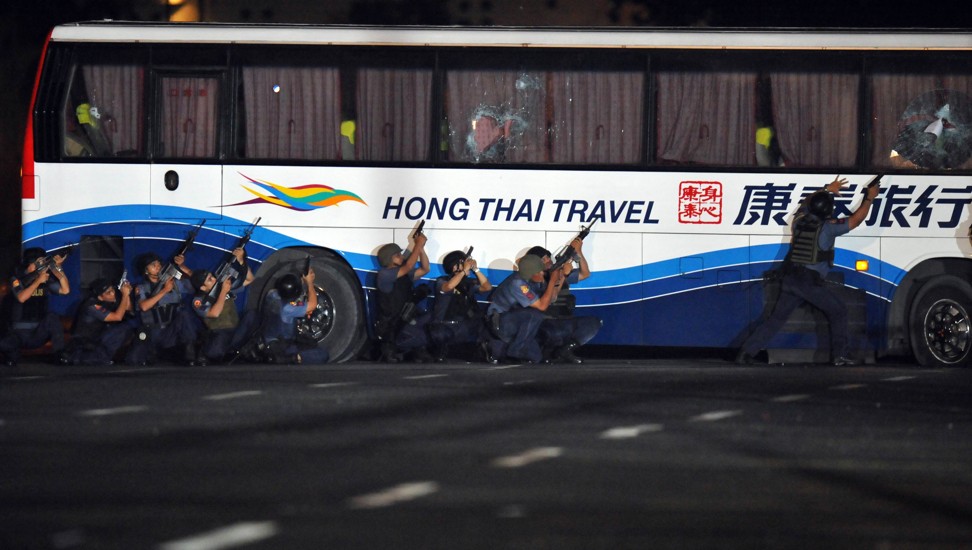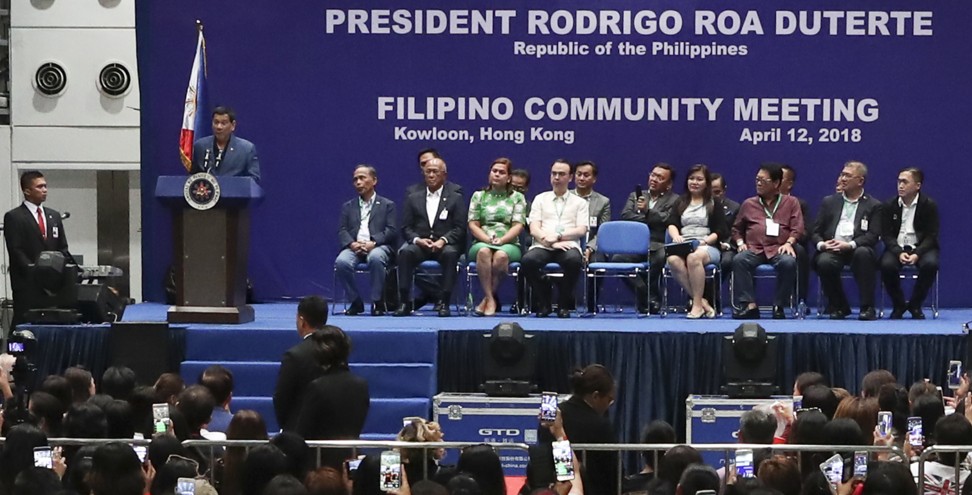
Did Duterte have ulterior motive in apologising for hostage crisis that killed eight Hongkongers?
With senate elections looming, and the need to keep China onside, some are not convinced that president’s apology was entirely altruistic
Members of the Filipino community in Hong Kong have questioned the sincerity of President Rodrigo Duterte’s apology for the Manila bus hostage crisis.
The Philippine leader said sorry for the 2010 incident, which claimed the lives of eight Hongkongers, during a meeting with some 2,500 of his fellow countrymen and women on Thursday, the last day of his unofficial three-day visit.

“The HKSAR government understands that the tragedy remains unforgettable to Hong Kong people, and hopes that with the formal apology by the President of the Philippines, Mr Rodrigo Duterte, the victims and their family members will feel relieved from the sorrow,” a government spokesman said.
What does Philippine leader Rodrigo Duterte eat in Hong Kong? Jollibee
However, United Filipinos chairwoman Dolores Balladares questioned the timing of the apology, especially as Duterte was back in Hong Kong for the second time in 10 months.
“Last year when he was here he should have made the apology,” she said. “On his second visit why did he suddenly apologise? It would have been better if it was made last year as it was a new government.
“People would question Duterte, why now? In his speech yesterday, he was praising China, that the Hong Kong employers are good, that we should work properly and follow what the bosses say. It was pampapogi [to earn brownie points] with China.”
Duterte’s trip overall has not sat well with some members of the Filipino community, who saw his meet and greet on Thursday as little more than a campaign rally.
Student activists barred at last minute from Duterte ‘meet and greet’ gathering in Hong Kong
“Yesterday, it was so obvious that Duterte was telling the Filipino audience to vote for would-be Senate candidates, heaping praise on his ‘favourite’, special presidential assistant Christopher Go, Secretary of Labour and Employment Silvestre Bello, presidential spokesman Harry Roque, as well as Francis Tolentino, the chairman of the Metropolitan Manila Development Authority,” Balladares said.
Eman Villanueva, spokesman for the Asian Migrants Coordinating Body, said several community leaders who had attended Thursday’s event told the body they were “very frustrated” as they thought there would be an open forum.
“It was titled ‘Filipino community meeting’ with President Duterte, but it turned out to be a miting de avance [advance campaign rally],’’ Villanueva said.

Other members of the community warned against the dangers of embracing Chinese investment, which they said was a double-edged sword.
“The apology was probably made because he wanted to appease China and he needed to do that to reduce the tension between Hong Kong and the Philippines,” Ramon Bultron, managing director of Asia-Pacific Mission for Migrants, said.
“But he is trying to make a friend of China and the apology was one way for him to lessen the tension. But the problem is the return of friendship means more of a burden for the country. One is on the territorial concerns, giving a lot of concessions to China.
Philippine foreign minister on why Duterte and Xi Jinping get along
“Second, even with the supposed investment opportunities in the Philippines, the [Chinese] investment turns out to be loans and the Filipino people are actually shouldering the burden in the long run. He is using it as campaign propaganda.”
Duterte’s apology was the first time a Philippine leader said sorry for the August 23, 2010 incident, where a rogue police officer took passengers on a tour bus hostage at the historic Rizal Park. A botched rescue operation left the gunman, plus seven Hong Kong tourists and their tour guide, dead and nine injured.
Acknowledging his country’s role for the first time, Duterte told the meeting of Hong Kong’s Filipino community at Kai Tak Cruise Terminal: “May I address the Chinese people who are here. From the bottom of my heart, as president of the Republic of the Philippines, and on behalf of the people of the Philippines, may I apologise and say sorry that the incident happened and as humanly possible I would like to make this guarantee – it will never happen again.”

